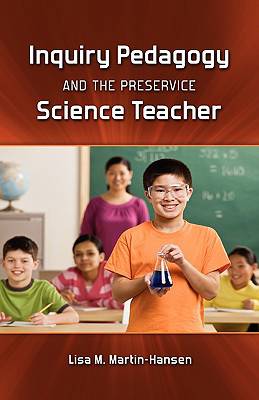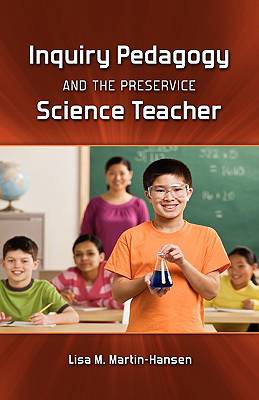
Door een staking bij bpost kan je online bestelling op dit moment iets langer onderweg zijn dan voorzien. Dringend iets nodig? Onze winkels ontvangen jou met open armen!
- Afhalen na 1 uur in een winkel met voorraad
- Gratis thuislevering in België vanaf € 30
- Ruim aanbod met 7 miljoen producten
Door een staking bij bpost kan je online bestelling op dit moment iets langer onderweg zijn dan voorzien. Dringend iets nodig? Onze winkels ontvangen jou met open armen!
- Afhalen na 1 uur in een winkel met voorraad
- Gratis thuislevering in België vanaf € 30
- Ruim aanbod met 7 miljoen producten
Zoeken
€ 142,45
+ 284 punten
Omschrijving
Inquiry pedagogy was promoted heavily by John Dewey in the early 1900s as he described how students should not only learn about science, but also participate in problem-solving and scientific practices as part of their education. Sixty years later, the National Science Education Standards (NSES) were published (National Research Council, 1996) echoing Dewey's recommendations for educators to teach science less didactically and to include the development of critical thinking in a variety of ways - including scientific inquiry. The NSES (pg. 31) stated, "Inquiry into authentic questions generated from student experiences is the central strategy for teaching science." Despite emphasis placed upon inquiry teaching practices in the ebb and flow of conversations over the last century, science educators still struggle to move current and future educators to a place where inquiry pedagogy is a regular part of what happens as part of science learning in the classroom. This is a multifaceted issue facing us with factors inhibiting inquiry teaching practices including the lack of prior experiences learning through inquiry, the pressures of high-stakes standardized tests that seemingly do not support inquiry learning, and other school culture issues that exist. Most science majors who are inspired to become teachers of children learning science have experienced very didactic or traditional forms of learning throughout their educational careers. These science majors, a relatively small group of U.S. students, have experienced a type of success in learning about science that is not necessarily paralleled by their peers who were not successful in science classes. This dilemma poses a problem for science educators as we work to include science "for all Americans" making science accessible to all students -- not only the few who later enter science careers. These same science majors, some of who become preservice science teachers, are often resistant to new types of teaching as they have felt personal success in learning science traditionally through textbook reading and verification labs and are hesitant to teach in any other way than how they were taught. This book examines secondary science preservice teachers as they reflect upon their teaching practices, their educational philosophies, and their student teaching experiences as they attempt to teach using inquiry pedagogy. Little research literature exists that follows preservice teachers through their development in a science education program as they are challenged in learning how to teach using inquiry pedagogy. This book highlights the successes and struggles as told by preservice teachers through their writing and interviews. Additionally, as part of their student teaching, the preservice teachers were asked to submit a video showing evidence of inquiry pedagogy in their classrooms. The lesson plans and video data were analyzed to determine whether or not the preservice teachers were indeed attempting to teach science content through inquiry. The lessons learned include the importance of the influential teacher-mentor, as well as the need for science educators to provide repeated, sustained, and guided inquiry experiences for preservice science teachers. Inquiry Pedagogy and the Preservice Science Teacher is an important book for those who are studying and researching about inquiry pedagogy in science education.
Specificaties
Betrokkenen
- Auteur(s):
- Uitgeverij:
Inhoud
- Aantal bladzijden:
- 244
- Taal:
- Engels
Eigenschappen
- Productcode (EAN):
- 9781604976663
- Verschijningsdatum:
- 28/12/2009
- Uitvoering:
- Hardcover
- Formaat:
- Genaaid
- Afmetingen:
- 140 mm x 216 mm
- Gewicht:
- 458 g

Alleen bij Standaard Boekhandel
+ 284 punten op je klantenkaart van Standaard Boekhandel
Beoordelingen
We publiceren alleen reviews die voldoen aan de voorwaarden voor reviews. Bekijk onze voorwaarden voor reviews.











